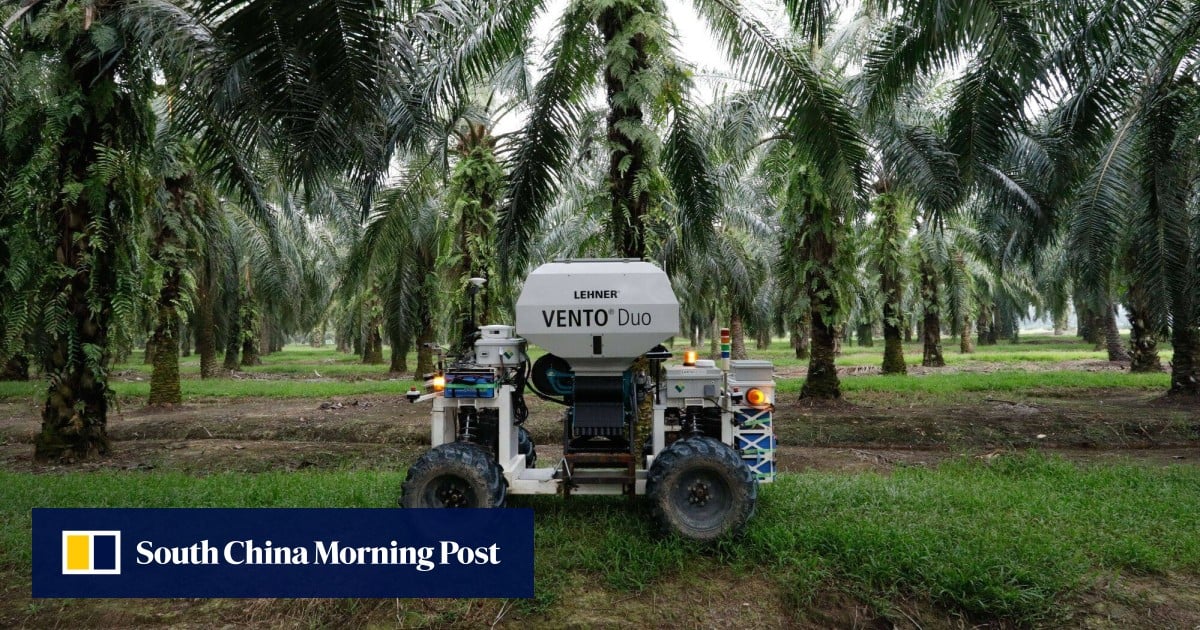“To depend on foreign workers for all these key tasks is actually putting this industry at a very high risk,” Helmy said. “This is why we have to take this plunge. We really have to place these bets.”
Perfecting the robots and deploying them at a commercially viable scale will take years, even as firms pour millions into developing such technology and retraining their staff to use it. But producers are pressing ahead.
The plantation workforce in Malaysia – the world’s No 2 palm oil producer – was hollowed out during the pandemic, when border restrictions meant companies could not bring in the foreign workers they so heavily rely on. It was the country’s worst-ever worker shortage and palm oil production plummeted, pushing prices to record highs. The industry lost billions.
SD Guthrie learned its lesson. Where possible, the firm has started using machines to take over non-harvesting jobs like spraying pesticide or monitoring fruit and yields. Where the industry average is currently for one worker to maintain 8-10 hectares of land, the company wants to boost that to about 17 hectares per worker with the aid of automation.
The company’s investment into robots is set to reach 100 million ringgit (US$21.2 million) – or about half its research and development budget – by year-end and it “will spend whatever is required to find a solution,” according to Helmy. Nearly 30 per cent of its annual R&D budget will be spent on this initiative in the next three to four years.
The robots aren’t fully autonomous yet, meaning there is still a need for skilled workers to control and manoeuvre them. Plus, trickier tasks remain in the hands of humans – like safely cutting down ripe fruit bunches from trees that can be as tall as six-story buildings.
But the technological advances have already opened up an avenue for women to join a traditionally male-dominated workforce. Sri Norhidayu Kussain, a 41-year-old woman, says the robots help with back-breaking tasks like lifting 30-kg (66-pound) fruit bunches and loading them into trucks.
“The work is now easier because these machines have successfully reduced the need for physical labour. It’s no longer like before when only men could do these type of jobs,” said Norhidayu, who operates a pesticide-spraying vehicle that can do the job of six workers at SD Guthrie’s Sungai Linau estate in Malaysia’s central state of Selangor.
Women make up 3 per cent of the company’s roughly 700 machine operators and Helmy says the company is trying to attract more.
Labour shortfalls have long been a headache for Malaysian businesses, partially because of strict immigration rules targeting low-skilled workers that in turn have encouraged trafficking and left thousands of undocumented workers without legal protection. International scrutiny of labour abuses has pushed the country to reduce its reliance across several industries including manufacturing, construction and plantations.
SD Guthrie itself faced allegations of forced labour that resulted in a two-year US ban on imports of its products in 2020 – something that Helmy said urged the firm to explore automation.
“Automation, if rolled out strategically will not hurt workers’ livelihoods,” said Adrian Pereira, executive director at the North South Initiative, a Malaysia-based non-governmental organisation focused on social justice. “We really hope government-linked companies will take the lead and demonstrate that this sector can be free of forced labour soon.”
SD Guthrie is the first plantation company in the country to set up a research facility dedicated to developing robots. Other palm giants like Golden Agri-Resources Ltd. and IOI Corp Bhd. have also invested in mechanisation and artificial intelligence to help harvest the oil used in everything from chocolate to soaps and fuel.
A plantation run entirely by robots will not be a reality soon. Technical issues like getting the robots to self-navigate through hilly terrain or correctly identify ripe fruit bunches, have held back past automation initiatives. This is in stark contrast to crops like soybeans or rapeseed – waist-high row crops grown on flat fields – where farmers can tend to hundreds of hectares with tractors and giant harvesting machines.
But speaking amid whirring and beeping prototypes at the company’s robotics lab in Selangor, the firm’s Chief Digital Officer Aditya Tuli said change was here to stay.
“Once we start mechanising, we do imagine that there will be an increase or a positive impact to production numbers,” he said. “We are chasing that.”


